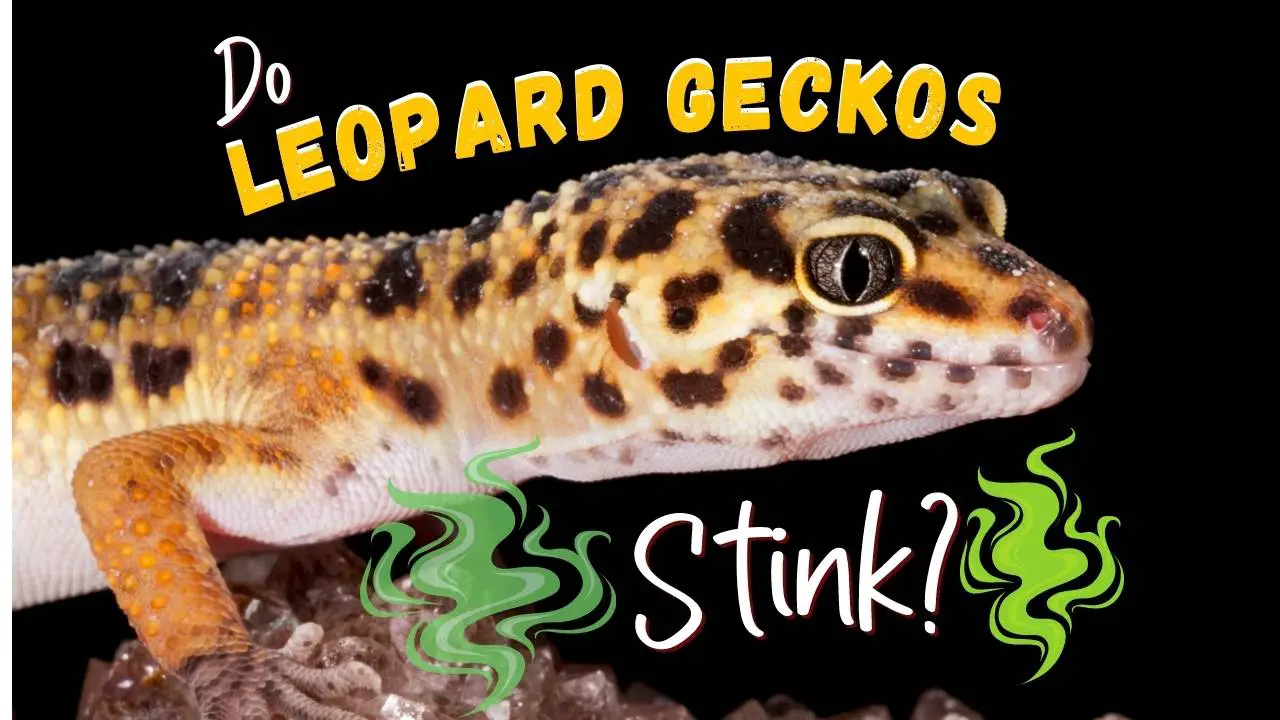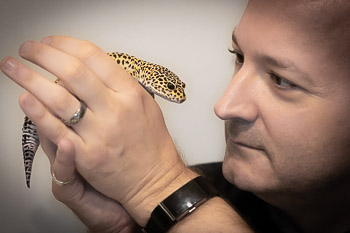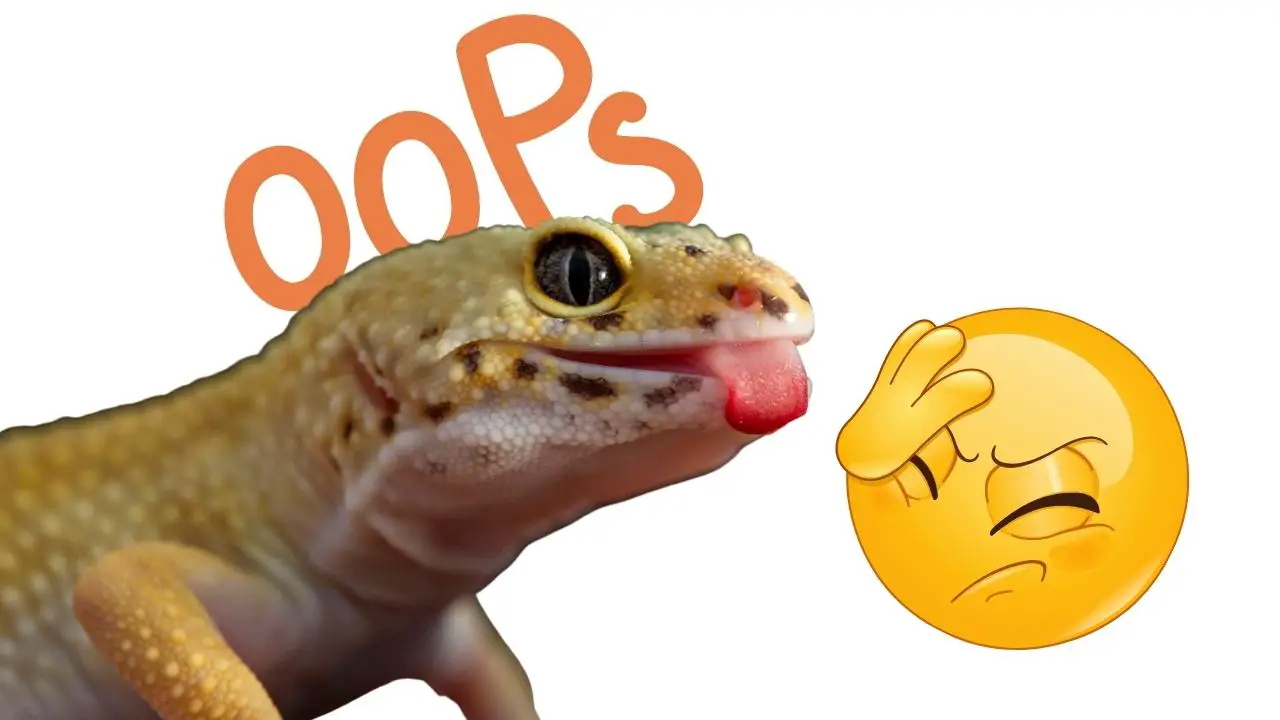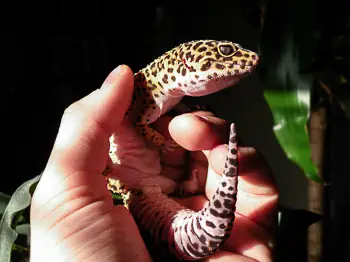Do you dread walking past your leopard gecko’s tank because of the overwhelming stench that greets you? Does the smell of their enclosure make you feel like you’re stepping into a sewer? Many leopard gecko owners face the same pet odor issues.
Leopard geckos themselves typically do not smell bad. While leopard geckos are known for being low-maintenance and odorless pets, they still produce waste and shed their skin regularly, which can lead to an unpleasant odor in their enclosure. Live feeder insects and their bins are often a source of bad smells.
But don’t worry, as long as you keep their tanks clean and follow a few feeding tips, you can eliminate the smell and enjoy the company of your gecko without any discomfort. In this article, we will explore the causes of smell in leopard gecko tanks and provide you with cleaning and feeding tips to keep your gecko tank odor-free.
Key Takeaways:
- Leopard geckos themselves typically do not smell bad.
- Proper tank maintenance is important to controlling leopard gecko odor.
- Factors such as poor hygiene, high humidity, unsuitable substrate, and improper diet can contribute to odor.
- Regular cleaning and bedding replacement, natural cleaning solutions, and proper ventilation can help reduce odor.
- Feeding leopard geckos live insects is an important part of a balanced diet. Feeder insects and their bins are often the sources of unpleasant odors.
Causes of Smell in Leopard Gecko Tanks
If you’re wondering why your leopard gecko’s tank stinks, it’s likely due to a few different factors. One of the main culprits could be the terrarium hygiene. If you’re not cleaning the tank regularly, it can lead to a build-up of feces, urates, and uneaten food. This can cause an odor that will only get worse over time. It’s important to clean the tank regularly to prevent this from happening.
Bacteria Growth
Another factor that could contribute to the smell is the humidity levels in the tank. Leopard geckos require a relatively dry environment (30-40% humidity), so if the tank is too humid, it can lead to bacterial growth and a funky smell. Make sure the tank has proper ventilation and it’s not too moist or humid.
Substrate
Additionally, the substrate you choose can also make a difference. Avoid using loose substrates or sand, as they can trap bacteria and contribute to a foul smell. Consider switching to a substrate that is easier to clean and doesn’t retain moisture.
Paper towels are great for juvenile geckos, but are usually not a permanent solution. Opt for reptile carpet to a tile substrate, as they are easier to clean and don’t retain moisture. Check out our choice for the best leopard gecko substrate.
Diet and Feeder Insects
Finally, the diet of your leopard gecko can also impact the smell of the tank. Feeding your gecko too much or too often can lead to leftover food and waste. Consider adjusting the feeding schedule or portion sizes to see if this makes a difference, and remove uneaten insects from the enclosure; especially crickets.
Crickets stink. If you are keeping live crickets near your gecko enclosure, chances are the bad smell is coming from the crickets, not the gecko. You’ll need to clean the crickets enclosure more frequently than the gecko tank to clear out feces and dead insects. It may be surprising, but dubia roaches smell better than crickets, and make a good alternative feeder insect. (They’re also quieter!)
Additionally, if you’re gut loading your insects with fruits and/or vegetables, check their uneaten food as well before it starts to rot. Refresh the substrate in the insect bins to clear out poop and dead insects. It not only cuts down on the smell, but keeps them healthy. Healthy food = healthy gecko!
Taking preventive measures such as these can help keep your leopard gecko’s tank smelling fresh and clean.
Related Post: Do Leopard Geckos Need Baths?
Cleaning Tips for Controlling Odors
Leopard geckos are fairly clean reptiles, though still need some tank maintenance and cleaning. Neglecting to do so can lead to a buildup of bacteria and waste, resulting in an unpleasant odor. Here are some tips to help you control the smell in your leopard gecko’s enclosure:
- Use appropriate cleaning products: Avoid using harsh chemicals and opt for natural cleaning solutions instead. Vinegar and water is a great option for cleaning surfaces, while a reptile-safe disinfectant like Zoo Med Wipe Out 1 can be used for more thorough cleaning.
- Consider the enclosure size: A larger enclosure can help reduce the concentration of waste and odor. Providing ample space for your pet to roam and explore can also improve their overall health and well-being.
- Proper ventilation can help circulate fresh air and reduce the buildup of odor.
Spot Cleaning
Spot cleaning your pet’s enclosure can be a quick and easy way to remove any messes and keep odors at bay. This method involves cleaning up any visible waste or soiled areas as soon as you notice them. Scoop the poop and remove any shed skin or debris in the enclosure.
To make the process even more efficient, you can keep a small kit of cleaning supplies and paper towels near your pet’s habitat.
By staying on top of spot cleaning, you can prevent larger messes from building up and causing unpleasant smells. In addition to these quick cleanups, it’s important to regularly deep clean your pet’s enclosure and take preventative measures to keep odors under control.
Regular Cleanings
You know what’s even better than spot cleaning? Regular deep cleanings! Trust me, your nostrils will thank you.
Deep cleaning your leopard gecko’s enclosure is essential to keep your pet healthy and happy. While spot cleaning can keep things in check on a day-to-day basis, regular cleanings are necessary to eliminate any odor or bacteria that may build up over time. During a deep cleaning, you’ll remove and sanitize everything in the tank.
Remember to clean the enclosures or bins of live insects as well.
Related Post: How to Clean a Leopard Gecko Tank
By making regular cleanings a part of your leopard gecko care routine, you’ll be doing a great service for your pet and your nose!
Wrap Up – Do Leopard Geckos Smell Bad?
Leopard geckos by themselves don’t stink. Even leopard gecko poop doesn’t have much of an odor unless you let it pile up. Dirty enclosures are usually the source of any bad smells associated with leopard geckos.
Keeping the tank clean (and the feeder insects’ tanks) will go a long way to keeping your space odor free. Make sure to spot clean your gecko’s tank regularly, removing any feces or uneaten food. This will prevent the buildup of bacteria and other odor-causing substances.
Perform regular deep cleanings of the tank, replacing substrate and disinfecting surfaces. Make sure that the tank isn’t too humid, which also provides a breeding ground for bacteria.
By following these tips, you can ensure that your leopard gecko’s tank stays odor-free and enjoyable for both you and your pet.






